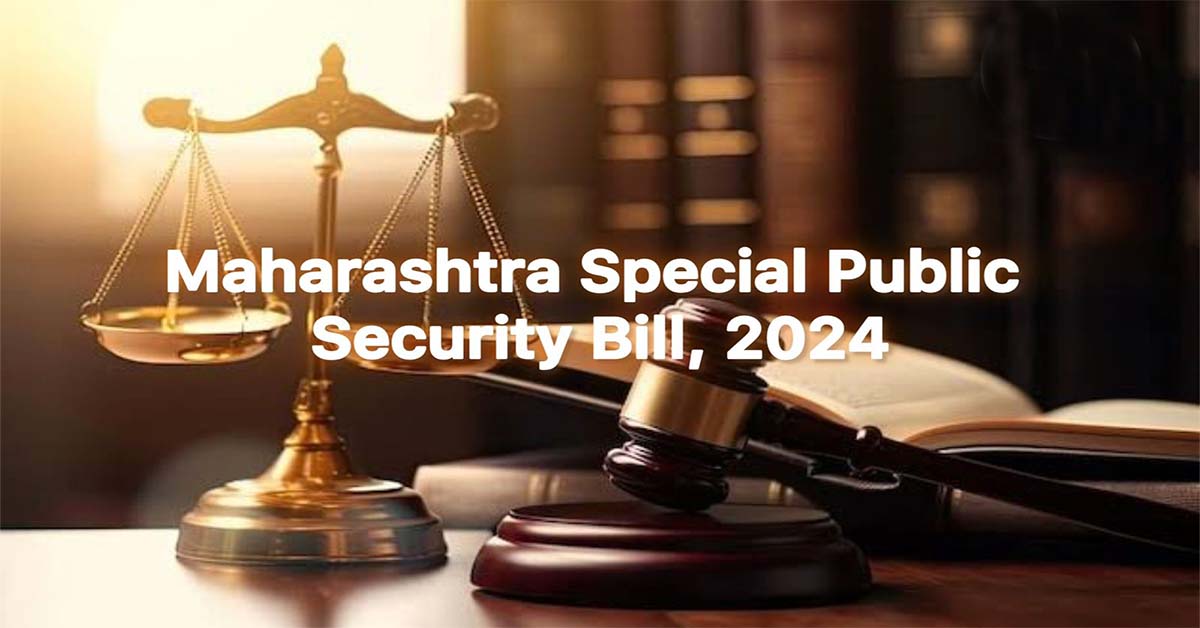On April 1, 2025, Citizens for Justice and Peace (CJP) submitted strong objections to the Joint Select Committee reviewing the Maharashtra Special Public Security Bill, 2024 (MSPS Bill). The organisation has raised serious concerns about the bill’s broad and ambiguous provisions, excessive executive powers, and grave threats to constitutional rights.
Framed as a measure to bolster public security, the bill instead severely curtails civil liberties, granting the state unchecked authority for surveillance, to detain, and criminalise dissent. CJP has flagged several provisions that could be weaponised to suppress free speech, peaceful assembly, and activism. Calling for its immediate withdrawal, the organisation warns that the bill mirrors the draconian framework of past laws like the Unlawful Activities (Prevention) Act (UAPA) and the National Security Act (NSA), both of which have been routinely misused to stifle opposition and target marginalised communities.
Key objections raised by CJP
- Section (2) (f) (i) to (vii): Overbroad definitions of “an unlawful activity”
CJP has flagged Section (2) (f) (i), which defines “an unlawful activity” in vague and sweeping terms. The broad language allows the government to label almost any activity as a security threat, including peaceful protests, strikes, or political dissent. Such an expansive definition could be used to arbitrarily justify restrictions on fundamental freedoms.
- Section 5(1)(2): Politicisation of the Advisory Board
The bill provides for the setting up of an Advisory Board under Section 5(1)(2) to adjudicate on actions taken by the state government, police, and administration. However, CJP has raised concerns over the qualifications of its members. Unlike previous laws governing public security and counter-terrorism, which mandated sitting or retired High Court judges, this bill allows for the appointment of individuals who “are, have been, or are qualified to be appointed as Judges of the High Court.”
This wording dilutes the judicial independence of the Advisory Board by allowing for the inclusion of retired judges, non-appointed officials, or lawyers with no prior judicial experience. This opens the door for politically aligned or executive-friendly individuals to occupy key decision-making positions, making the Board prone to bias and manipulation in favour of the state.
- Section 9: Arbitrary eviction and property seizure
One of the most alarming provisions flagged by CJP is Section 9, which gives the District Magistrate (DM) or the Police Commissioner unchecked authority to take possession of, or seize, any notified area and evict persons from the premises. The bill provides only minimal protection for women and children, stating that they must be given a “reasonable time” to vacate—a vague and insufficient safeguard.
Such an arbitrary provision could be used to forcibly evict communities under the guise of maintaining public security, particularly targeting politically inconvenient groups, protest sites, or informal settlements.
- Section 10(1): Extension of seizure powers to moveable property
Further compounding the concerns around Section 9, Section 10(1) grants the administration unchecked authority to seize moveable property, money, and other assets found within a seized premise. This means that not only can entire homes or offices be taken over, but all belongings inside can also be confiscated without clear legal safeguards.
CJP warns that such provisions can be used to financially ruin individuals or organisations that the government views as adversaries. Activists, journalists, and opposition members could be disproportionately affected by these extreme measures.
- Section 12: Denial of legal redress at district level
Shockingly, Section 12 of the draft MSPP Bill, 2024 prevents individuals arrested under this law from seeking legal recourse at the district level. Instead, only the High Court and Supreme Court are designated as proper forums for filing petitions to challenge any actions under the law.
CJP has strongly criticised this provision, arguing that it directly violates India’s four-tier system of judicial redressal and creates unnecessary barriers to justice, particularly for economically disadvantaged individuals who may not have the resources to approach higher courts. The rationale for this provision remains unclear, raising concerns that it is intended to stifle legal challenges against the law.
- Sections 14 and 15: Blanket immunity for police and bureaucrats
Under Sections 14 and 15, police officers and district magistrates are granted complete immunity from prosecution, even in cases where courts pass strictures against their misuse of the law. These sections explicitly state that no action can be initiated against such officials, even if they engage in blatant misuse or wrongful prosecution under the MSPS Bill.
CJP warns that these provisions effectively shield law enforcement from accountability, encouraging impunity and opening the door to widespread abuse of power. This provision closely resembles the impunity granted to security forces under draconian laws like the Armed Forces (Special Powers) Act (AFSPA), which has led to grave human rights violations.
Violation of Constitutional Rights
CJP has strongly asserted that the MSPS Bill violates fundamental rights guaranteed under the Indian Constitution, including:
- Article 19 (Freedom of Speech, Assembly, and Association) – By allowing the government to criminalise protests, public gatherings, and activism, the bill directly undermines democratic freedoms.
- Article 21 (Right to Life and Personal Liberty) – Sections on preventive detention and surveillance threaten personal liberty and privacy.
- Article 14 (Right to Equality) – The arbitrary powers granted by the bill could lead to selective enforcement, disproportionately targeting marginalised communities, activists, and opposition groups.
CJP’s call for immediate withdrawal of the bill
The Maharashtra Special Public Security Bill, 2024, as highlighted by CJP, represents a major threat to democracy and civil liberties. By granting the state unchecked powers to surveil, detain, and prosecute individuals without due process, the bill paves the way for state repression under the guise of public security. CJP’s objections serve as a crucial intervention in the fight to preserve constitutional freedoms, urging the government to scrap the bill and uphold democratic values.
The detailed objections may be read here.
The detailed objections (Hindi) may be read here.
The detailed objections (Marathi) may be read here.
Related:
New Criminal Laws: Future risks for democracy and rights in India

